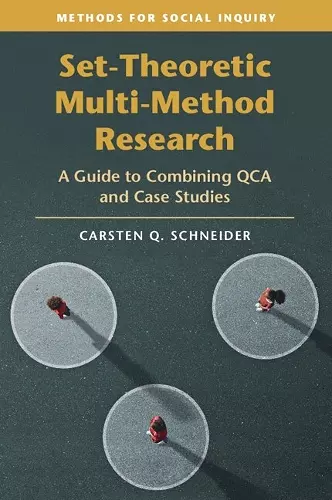Set-Theoretic Multi-Method Research
A Guide to Combining QCA and Case Studies
Format:Paperback
Publisher:Cambridge University Press
Published:29th Feb '24
Currently unavailable, and unfortunately no date known when it will be back
This paperback is available in another edition too:
- Hardback£70.00(9781009307147)

A comprehensive introduction to SMMR (set-theoretic multi-method research), the applied combination of QCA and case studies, using R software.
A comprehensive introduction to combining Qualitative Comparative Analysis (QCA) and case studies using R software. With its practical focus, this book facilitates the efficient and independent learning of SMMR (set-theoretic multi-method research) for students, researchers, and practitioners in the social sciences.A state-of-the-art comprehensive exposition of combining Qualitative Comparative Analysis (QCA) and case studies, this book facilitates the efficient use and independent learning of this form of SMMR (set-theoretic multi-method research) with the best available software. It will reduce the time and effort required when performing both QCA and case studies within the same research project. This is achieved by spelling out the conceptual principles and practices in SMMR, and by introducing a tailor-made R software package. With an applied and practical focus, this is an intuitive resource for implementing the most complete protocol of SMMR. Features include Learning Goals, Core Points, and Empirical Examples, as well as boxed examples of R codes and the R output it produces. There is also a glossary for key SMMR terms. Additional online material is available, comprising machine-readable datasets and R scripts for replication and independent learning.
'Carsten Schneider has forgotten more about set-theoretic methods than you and I can ever hope to know. This book is the one you need if you are an (applied) researcher, looking to combine cross-case inferences and within-case analysis. It's so insightful you better not put it on the shelf but on your desk.' Bart Cambré, Professor Business Research Methods, Antwerp Management School and University of Antwerp
'Combining QCA and case study tools has long been emphasized for stronger causal inference, but Carsten Schneider's book takes it to another level by developing a comprehensive approach for just how to do it right. Well-argued and chock full of insight, with many empirical illustrations, it makes a compelling case for multi-method research. I consider it required reading for anyone working in the comparative perspective.' Peer C. Fiss, Jill and Frank Fertitta Chair in Business Administration, University of Southern California Marshall School of Business
'This long awaited volume is a must-read for anyone striving to build on the respective strengths of QCA and case-based work. It enables the fruitful bridging of cross-case and within-case analysis by providing both a robust conceptual framework and technically precise protocols.' Benoît Rihoux, Full Professor, University of Louvain (UCLouvain), Belgium
'This much awaited book is an essential, incredibly useful resource for all scholars who seek to take cases seriously and improve their descriptive and causal inferences using set-theoretic methods in a systematic, rigorous, yet intuitive way. Seemingly effortlessly, Schneider takes case-oriented set-theoretic methodology to the next level while putting practice centerstage, so that the book is both cutting-edge and accessible, and speaks to readers with basic or advanced knowledge of set-theoretic methods.' Eva Thomann, University of Konstanz
ISBN: 9781009307192
Dimensions: 228mm x 150mm x 14mm
Weight: 400g
276 pages